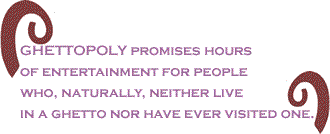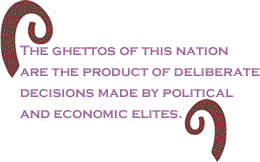Like
families that still pray, despite an environment that would
make the most devout wonder if there was a God at
all, let alone one who still cared about us.
Chang’s
biggest offense is in reinforcing the notion of the ghetto
as a free-standing entity, with an inherent culture, separate
from the rest of the society. But in truth, the ghettos
of this nation are the product of deliberate decisions
made by political and economic elites. Whatever culture
springs up in such places is not some intrinsic pathology
unique to the urban poor, but largely the consequence of
institutional racism and economic oppression.
Chang’s
game allows us to continue ignoring the most important
issue: namely, how did the ghetto become the ghetto in
the first place? Answers are easy to find, though apparently
Chang wasn’t interested in discovering them, seeing as
how doing so might have cut into his video game playing
and MTV viewing schedule.
Fact
is, during the first “great migration” of blacks from the
south, zoning laws (not to mention overt violence) tightly
restricted where people of color were allowed to live.
As a result of limitations on black residential mobility,
families often had to double-up in small apartments, which
were rarely taken care of by landlords who had little incentive
to improve their properties, since they knew there was
nowhere else for black tenants to turn.
Then
in the 1930s, the government began offering low-interest,
taxpayer-guaranteed loans through the Federal Housing Administration.
Millions of families took part in the new program, and
the American middle-class was born. Over a thirty-year
period, over $100 billion in home equity was loaned through
these initiatives, but it was almost exclusively a white
middle-class created by these policies.
FHA
lending guidelines made it clear that loans were off-limits
to persons who lived in “declining” neighborhoods (and
every black neighborhood was rated as declining), and that, “If
a neighborhood is to retain stability, it is necessary
that properties shall continue to be occupied by the same
social and racial classes.”
In
other words, there would be few if any loans for blacks
seeking to move to mostly white areas either. So
blacks were restricted to the urban core at the very time
that the “American dream” was being subsidized for white
families.
As
if this wasn’t bad enough, local governments then began
the process of “urban renewal,” which meant the elimination
of low-and-moderate-income family housing, to be replaced
by office buildings, shopping centers and parking lots.
While
hundreds of thousands of homes (one-fifth of all housing
occupied at the time by people of color) were destroyed
as part of this process, less than 10 percent of those
displaced – three-fourths of whom were black – had new
single-resident housing to go to afterwards, as cities
rarely built new units to replace the old ones. Instead,
displaced families often had to rely on crowded apartments,
living with relatives, or living in run-down public housing
projects.
Since
then, most efforts to reduce crowding in public housing
by spreading subsidized residences throughout working and
middle-class neighborhoods have been blocked by those who
didn’t want persons from the “ghetto” living near them.
So the ghetto has remained isolated, wracked by concentrated
poverty and all the problems that come with it.
Those
problems include higher crime rates, family dissolution,
inferior health care facilities and thus, greater levels
of illness, and now, apparently, the privilege of becoming
the punch line in someone else’s idea of a joke.
None
of the above history will matter much to Chang, I’m sure,
or others who think making fun of “crack whores” is the
epitome of high comedy. But it should matter to us.
And
so should David’s phone number, which he gladly offers
on his website. I think we should let him know what we
think of his game, so by all means let’s do so. Give him
a ring at 866-444-3886, or drop him an email at [email protected].
And
then let Hasbro/Milton Bradley know about Chang’s games
too. You can reach them at 888-836-7025. Or e-mail Hasbro
Media contact Stacey Roberts at [email protected]. Let her know that
this detestable game, which rips off the concept of one
of their products is out there, and that as a company whose
own "diversity statement" claims a corporate
commitment to "respect and inclusion," surely
they would want to weigh in on the use of that concept
to disrespect entire communities.
Since
the layout, style and feel of GHETTOPOLY is more than a
little similar to the original from which the OPOLY part
of the name is taken, it shouldn’t take a particularly
brilliant patent and trademark lawyer to shut Mr.
Chang's fun down for good.
Tim
Wise is an antiracist essayist, activist and father.
He can be reached at [email protected]



